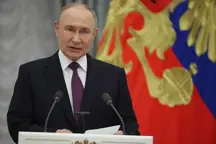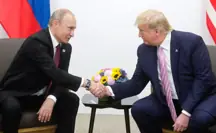On Friday, Russian President Vladimir Putin will travel to Alaska for a high-stakes summit with U.S. President Donald Trump.
This summit, taking place against the backdrop of an ongoing war in Ukraine, carries significant geopolitical weight, especially considering that Putin is wanted by the International Criminal Court (ICC) for war crimes.

In 2023, the ICC issued an arrest warrant for Putin, accusing him of war crimes, including the abduction and trafficking of Ukrainian children.
This raises a crucial question: Can Putin be arrested during his meeting with Trump in Alaska? According to military expert Hamish de Bretton-Gordon, the situation is complicated due to the United States’ stance on the ICC.
“The Americans aren’t [bound by the ICC], so — he can go to Alaska. That is the loophole. He can operate exactly how he sees fit. He wouldn’t have gone anywhere where potentially he could be arrested,” he told The Sun.
This highlights the fact that the United States, along with Russia, China, Pakistan, and a few other countries, has not signed onto the ICC framework, meaning Putin would not face arrest on U.S. soil despite the warrants against him.
The location of Alaska, positioned between the U.S. and Russia, adds another layer of significance to the meeting. The state’s geographical proximity to Russian territory is particularly noteworthy, with the two nations separated by just a few miles of water.

Putin’s decision to meet Trump in Alaska, according to de Bretton-Gordon, is not just about avoiding legal repercussions. “Putin is absolutely fixated about his own security, and his desire not to wander out of friendly airspace,” the expert explained. “There’s not much of that to Alaska — would only be in international airspace for a few miles.”
Additionally, the Russian leader might see this as a return to a region historically tied to Russian influence, as Alaska was once part of the Tsardom of Russia before being sold to the United States in 1867.
While the summit location is strategic for Putin, the question of who will attend remains uncertain. Initially, there were reports suggesting that Ukrainian President Volodymyr Zelensky might join the meeting, but the Kremlin quickly denied these rumors.
A White House official even suggested that if Zelensky was excluded, the entire summit could be called off. However, this was later contradicted by Trump, who stated he was happy to meet Putin regardless.
As of now, it seems the summit will feature only Trump and Putin, with the absence of Zelensky raising concerns about whether the interests of Ukraine will be properly represented.
“Zelensky is the most important person in all of this,” de Bretton-Gordon noted. “I think there’s pretty low confidence that anything that is acceptable to President Zelensky and the people of Ukraine is going to be decided.”
The absence of the Ukrainian leader could signal a lack of meaningful progress in the peace talks, with the outcome potentially favoring Russian interests over Ukraine’s.
Alaska’s role as the host of this summit is not only significant because of its location but also because of its history. Governor Mike Dunleavy emphasized the strategic importance of Alaska, stating, “Alaska is the most strategic location in the world, sitting at the crossroads of North America and Asia, with the Arctic to our north and the Pacific to our south.”
This positioning makes Alaska a logical choice for a summit between two global superpowers.
Russian media has portrayed the summit as a victory for Putin, casting it as a sign of diplomatic success and a blow to Zelensky’s influence.
However, it also offers an opportunity for Trump to demonstrate his leadership, especially as the United States plays host to Putin.
Trump’s decision to remain in Washington while Putin makes the long flight to Alaska has symbolic weight, as it places the onus on the Russian leader to travel.
The summit’s true purpose and its outcomes remain uncertain. As former British Army officer de Bretton-Gordon noted, the fact that the meeting is happening at all is an achievement, but who ultimately has the upper hand is still unclear. “Until fairly recently, it’s been pretty clear that President Putin has absolutely no desire for peace,” he said. “His aim at the beginning of his special military operation over three and a half years ago was to subjugate the whole of Ukraine.”
However, de Bretton-Gordon suggests that Trump may now realize Putin’s manipulations, leading to a shift in U.S. policy. “If Trump follows through with his sanctions and tariffs… then this is the reason I think that Putin has come to the table,” the expert explained. The economic pressure on Russia, especially with the country’s reliance on oil exports, could be a game-changer in any peace negotiations.
Despite the shifting dynamics, Putin still holds military momentum, with Russian forces continuing to advance in Ukraine. De Bretton-Gordon warned, “Russia seems to be moving forward slowly. Attacking civilian targets in Ukraine at an unbelievable scale.” This underscores the complex nature of the summit, where Trump might be eager to secure a deal, but such an agreement could come at a cost to Ukraine and its people.
Ultimately, the success of the meeting will hinge on how the talks unfold and whether both leaders can find common ground. The absence of Zelensky adds an element of uncertainty, as his presence would have been crucial in ensuring any agreement was truly beneficial for Ukraine. As de Bretton-Gordon put it, “A bad deal for Ukraine is worse than no deal at all.”

